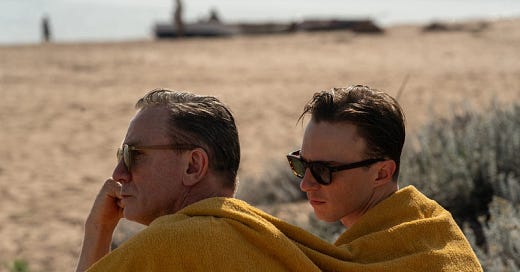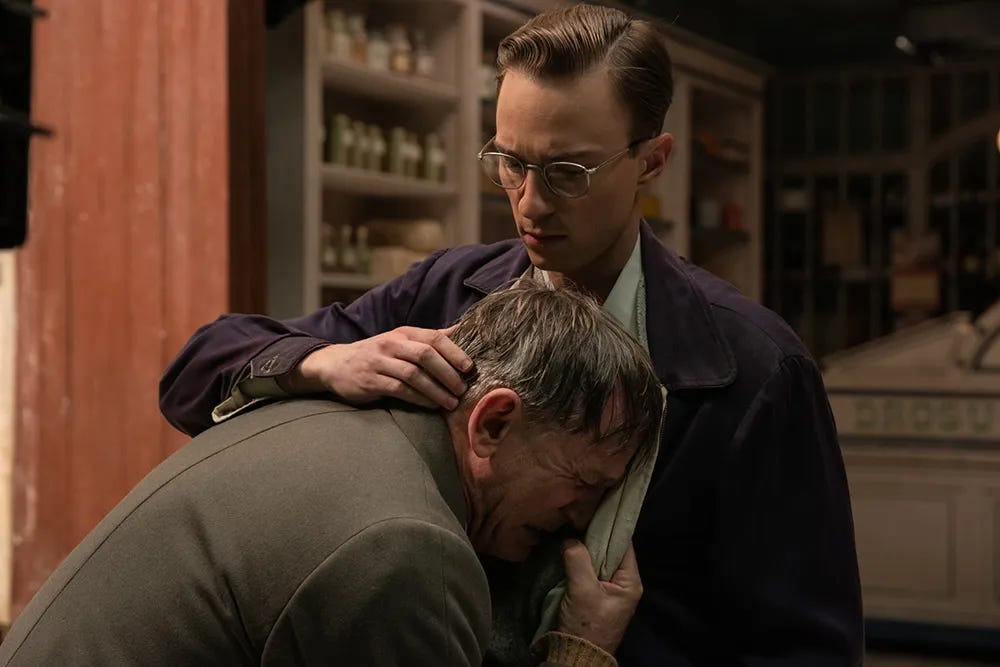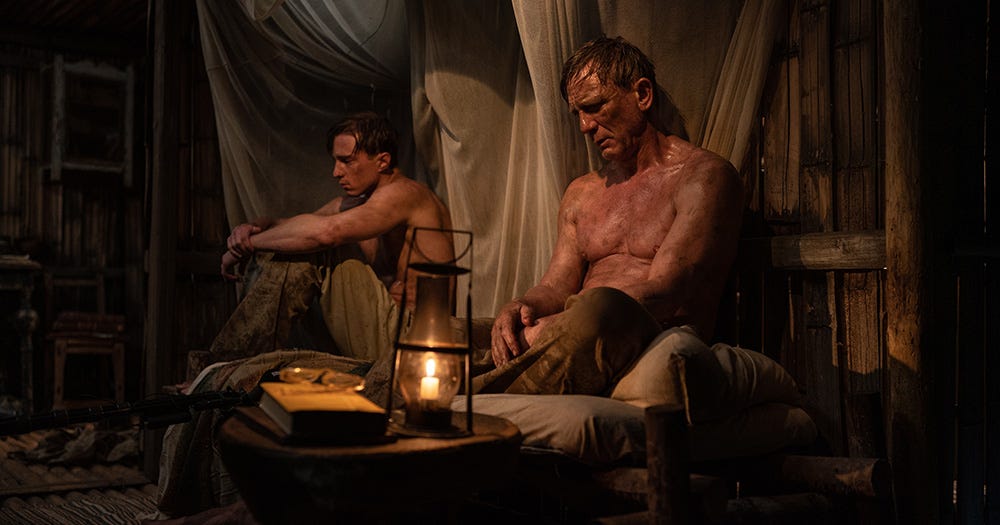The queer experience: it is a path of life so hard to explain to people who are not a part of the community. You go everyday yearning for a love that is so difficult to reach out and grab, and once you get it, it is hard to let it go. For years, I have craved a film that captured the complex feelings I have felt ever since I hit the teenage age. While I adore and respect a lot of queer media, there has not been a film that has represented my feelings as a gay individual as much as Luca Guadagnino's newest film Queer.
I remember when I was 14, feeling stuck in middle school, not sure who I really was. I mean, I knew I liked guys, but how do you deal with that? Sexuality is not a gene. Unfortunately, you are thrown into an environment you don't know anything about besides these feelings you have for the same sex. What happens when you have nobody there to help you? 14-year-old me struggled because how was he supposed to be who he was when he had no help? You have to find your own way, which is not always pretty. Even though the main character in Queer is an older gay man named Lee, played incredibly by Daniel Craig, he somehow experiences the same feelings I did when I was 14. It is those same feelings I feel now, just a few weeks away from entering my twenties. Being queer is like being in a cycle that you can only escape when you find the one, and good luck accomplishing that.
A lot of straight people do not realize the pain and longing we hold inside ourselves for so long because of the familiar straight experiences that most of us never get. For instance, where are our high school romances? Couples surround us throughout our teenage years, and the chance of finding a guy who will be out and proud with you is slim to none. So, this leads us to go down this intimidating fork in the road of trying to be yourself so you can find your true love but also wanting to conceal parts of yourself so you can fit in with others around you. Personally, I have found myself forever stuck in the madness of the latter idea because I am too scared to be even more alone than I already am. I get sick just saying that word. Loneliness. The other feeling of being queer that some people just do not get.
In the film, Lee has a blazing passion for men, longing for a connection between him and another man. A passionate scene between him and Omar Apollo, in his feature film debut, shows the casual nature gay people resort to. Lee, of course, has his moments of just wanting to fuck another guy, as we see here. Yet, it is to soothe the deeper, more excruciating feelings of loneliness because how is he going to find a man to love in 1950s Mexico? I'm sure it's better than 1950s America, which was propaganda-central, but that's a story for another day. Being queer means being subjected to a long history of keeping your love under wraps and casual, not getting attached to another man because the world would not accept that. Even though all of us in the community are not connected, the notion of this impermanent love feels like it is passed from generation to generation, like we are one big family. In a sense, that is somewhat true, and the film shows that, as the love interest of the film, Eugene Allerton, asks some of the older gays in the bars to show him around the gay scene in Mexico. Sure enough, we find Eugene with all the other girls and gays in a place together later in the film. More subduedly, the film delves into the idea of a chosen family, as you want to have people like you around in your life, but you don't want to feel connected to them just because you share the same sexuality. Yet, as the film depicts, that crafted family will always be there for you. Can you trust a man who doesn't even know who he is to be there for you for the rest of your life?
That idea brings me to the richest portion of the film: the relationship between Lee and Eugene. Lee walks down the street in the middle of the night, coming across a group of men feverishly watching two chickens brawl. The beginning chords of Nirvana's "Come As You Are" ring loud as Drew Starkey's Eugene walks into frame for the first time. His stare pierces into the eyes of viewers, his glasses resting on his face so sensitively as his suave, slicked-back hair compliments his white collared shirt that ever so delicately carves out his chest structure. It is hard not to stare at him the way Lee does, except we cannot go on the hunt like Lee does, leaving us entranced within Lee’s perseverance for the next two hours. This needle-drop moment is so crucial to the story's overarching themes. The Nirvana tune fits the scene so well, not just because it adds this sultry nature to Eugene but also because the song's message of breaking out of the assimilation the world tries to force you into is the heart of the relationship between the two men.
The shot that took my breath away is where Lee and Eugene are watching Jean Cocteau's Orpheus in a movie theater. It seems like a typical trip to the cinema until Lee starts to give off this astral projection, where he traces his hand around Eugene's face and leans in to kiss his neck. It is the beauty that so many gay men yearn for. The touch so hungered for through a sensational connection with another man, creating an out-of-body feeling—the desire of a man wanting a man.
Yet, our ghost-like motions remain, looming inside our minds as we think of the guys we so desperately want but don't know if they want us back. Throughout the film, we are unsure if Eugene is actually queer. Sure, he has sex with Lee, but only on his terms. Hours after one of their sexual encounters, Lee goes to lean in for a kiss, but Eugene pushes him down to the floor, telling him "I'm not queer," a repeated phrase throughout the film. Lee's receival of Eugene's actions is what gay people have to go through with people that don't know themselves. The rolling of the shoulders to get the other's hand off them. The sultry hangouts with a woman right in front of the man who loves you. Yet, you cannot force them to figure themselves out. Not only is it just shitty to do, but you just do not know what this person is feeling. Yet, it hurts when all you can think is that he feels disgust towards you. Being queer means you can find the perfect man for you, and he could never want you the way you want him because of his repulsion of not your feelings but the fact that you are another man.
Lee hears about ayahuasca, this plant that is supposed to give telepathic powers when ingested. He plans to go to South America to find it, spewing out the idea to Eugene, planning for him to come along with the glimmer of hope he might read the thoughts inside his lover's head. It is an idea that I feel like every gay person has because not only are you figuring out if the person even likes you back, but if they are also queer. The feeling is like getting lost in a jungle, not knowing where you might be, but it is an adventure you are willing to take. A small portion of the film takes place in a jungle, and for a second, I thought Guadagnino was about to lose me a bit. I mean, both Craig and Starkey looked like ripped out of an Indiana Jones flick with their jungle-exploring attire. However, the slight change of tone and the breathtaking storytelling within this sequence only furthers the powerful theme of identity in Queer.
Throughout the journey in the jungle, they discover an eccentric doctor, played by Lesley Manville. She questions why Lee is so adamant about taking the ayahuasca but realizes his desires when he reveals he is only interested in harnessing the telepathy. When the duo drinks the ayahuasca, a scene of devoted passion for the love of another human being unleashes on the screen. Drew Starkey starts by saying in his mind, "I'm not queer. I'm disembodied." It is a significant quote repeated throughout the film, forcefully impacting the idea of unaccepted queerness and the struggles of being queer onto the audience. The next scene brings the second part of that quote to life, as Lee and Eugene have a choreographed moment of intimacy during their trip. They dance together and embrace each other as their hands and faces slip into each other's skin, giving this haunting but captivating moment of shared passion.
There is beauty in queerness, and I don't want my earlier remarks detailing the struggles to make it seem like gay people have such a hard life. There are challenges, of course, just like any romance, regardless of your sexuality. However, there are times when life is a little more brutal when being queer. Yet, when you find that adoration, the love so desperately yearned for, its beauty flourishes into a spectacular array of wonder and fervor. That is what Luca Guadagnino and the cast and crew behind Queer sought to create with this film, and it is flawless in every department. I have seen a lot of movies throughout my life, but I don't think there is a film that has represented my feelings, my pain, my love, my happy moments, my life like Queer did. Being queer is hard, but being queer is also transcending.








❤️
this is so incredibly written, love it